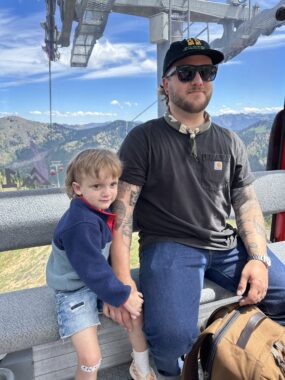Sometimes I wonder what ‘stable’ means regarding my son’s health
I know I should be happy, but worry always lingers in my mind
Written by |

Rare diseases bring a lot of unknowns to the lives of patients, caregivers, and family members. We caregivers often worry about what might be looming in the immediate, near, or distant future for our loved ones.
My 4-year-old son, Finley, who was born with Alagille syndrome, has been doing well given the circumstances. The focus of our doctor appointments over the past few years has largely been staying the course with his treatment. Doctors consider Finley to be stable, and during our latest appointment with the gastrointestinal (GI) team, that trend continued.
Heading into the appointment, I didn’t have any concerns to bring up with the GI doctor. But I’d be lying if I denied still having a cloud of worries hanging over my head.
It’d been six months since we last saw this doctor. Lab tests were done about a month ago, and although we’re getting pretty good at deciphering the results, I can’t help but worry about something I might not be aware of. Finley’s current prognosis is generally positive, yet the worry never goes away.

Columnist Jay Sandstrom and his 4-year-old son, Finley, enjoy a gondola ride during a recent outing. Doctors consider Finley’s Alagille syndrome stable. (Courtesy of Jay Sandstrom)
“Stable” is a word I’ve grown to both appreciate and loathe. In this case, it’s positive, as Finley is in a good spot with his health. He’s following his own growth curve and developmentally is on track. We currently need to see a cardiologist only once a year, and we have appointments with our GI team twice a year.
Our normal for ‘stable’
Mostly, we’re monitoring his progress and focusing on his nutrition. Despite how normal it’s become for us to prepare Finley’s medication twice a day and occasionally add fats to his food, I still feel the sting of worry when I remember what Alagille syndrome means for my child.
The term “stable” is, of course, a good thing, but strangely, it’s not exactly what I want to hear. For example, when Finley was only a few months old and was admitted to our local children’s hospital, I remember talking to the doctors to expedite all of the tests we needed so we could figure out what was going on with him. I remember asking, “Is he ever going to be OK?”
The doctors tried to console me and provide hope, but we didn’t have answers yet. I could read the room, though, and that worry about the unknown had crept in. Hearing the word “stable” to describe Finley’s condition a few years later is a victory, but it’s also a reminder that his liver disease isn’t going anywhere.
Still, I’ve learned to celebrate the status quo. I’m going to lean into the term “stable.” I’ll remember how far Finley’s come from where we were during the first few months of his life. Finley is smart, kind, wild, active, and sometimes frustrating. (What kid isn’t?) Staying the course is good. I’m working on tempering my worries. I know it’s not easy, but focusing on the good that’s happening is worth the effort.
Finley is doing great in his day-to-day-life, and that’s worth celebrating.
Note: Liver Disease News is strictly a news and information website about the disease. It does not provide medical advice, diagnosis, or treatment. This content is not intended to be a substitute for professional medical advice, diagnosis, or treatment. Always seek the advice of your physician or other qualified health provider with any questions you may have regarding a medical condition. Never disregard professional medical advice or delay in seeking it because of something you have read on this website. The opinions expressed in this column are not those of Liver Disease News or its parent company, Bionews, and are intended to spark discussion about issues pertaining to liver disease.



Leave a comment
Fill in the required fields to post. Your email address will not be published.